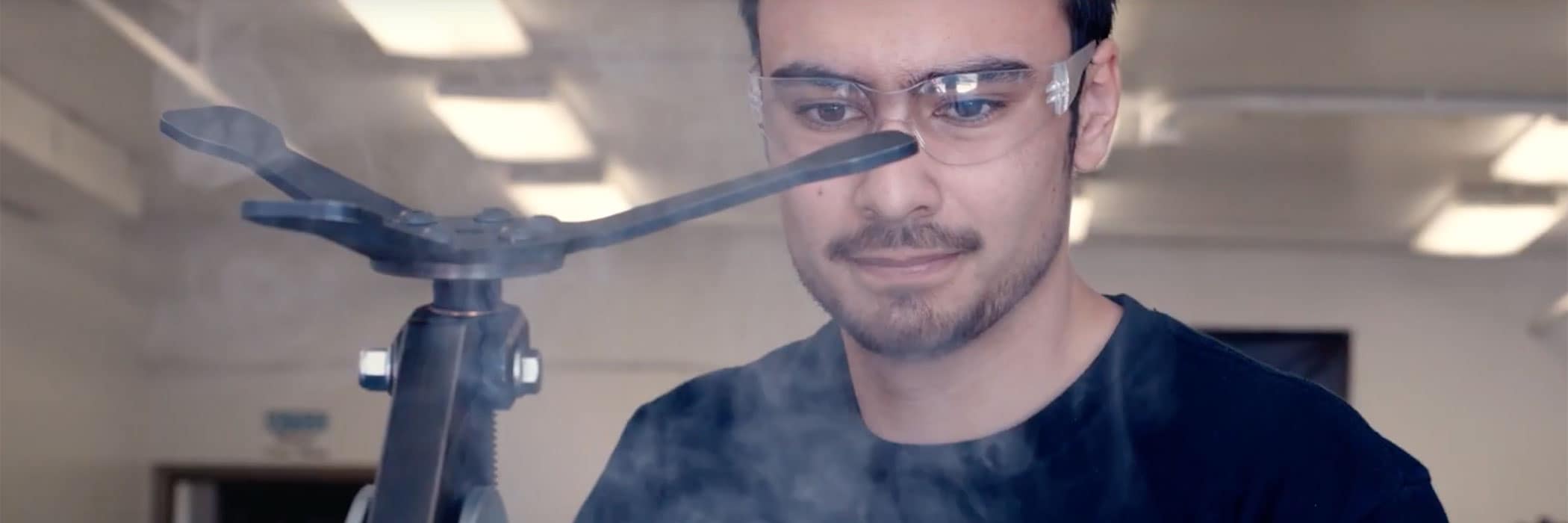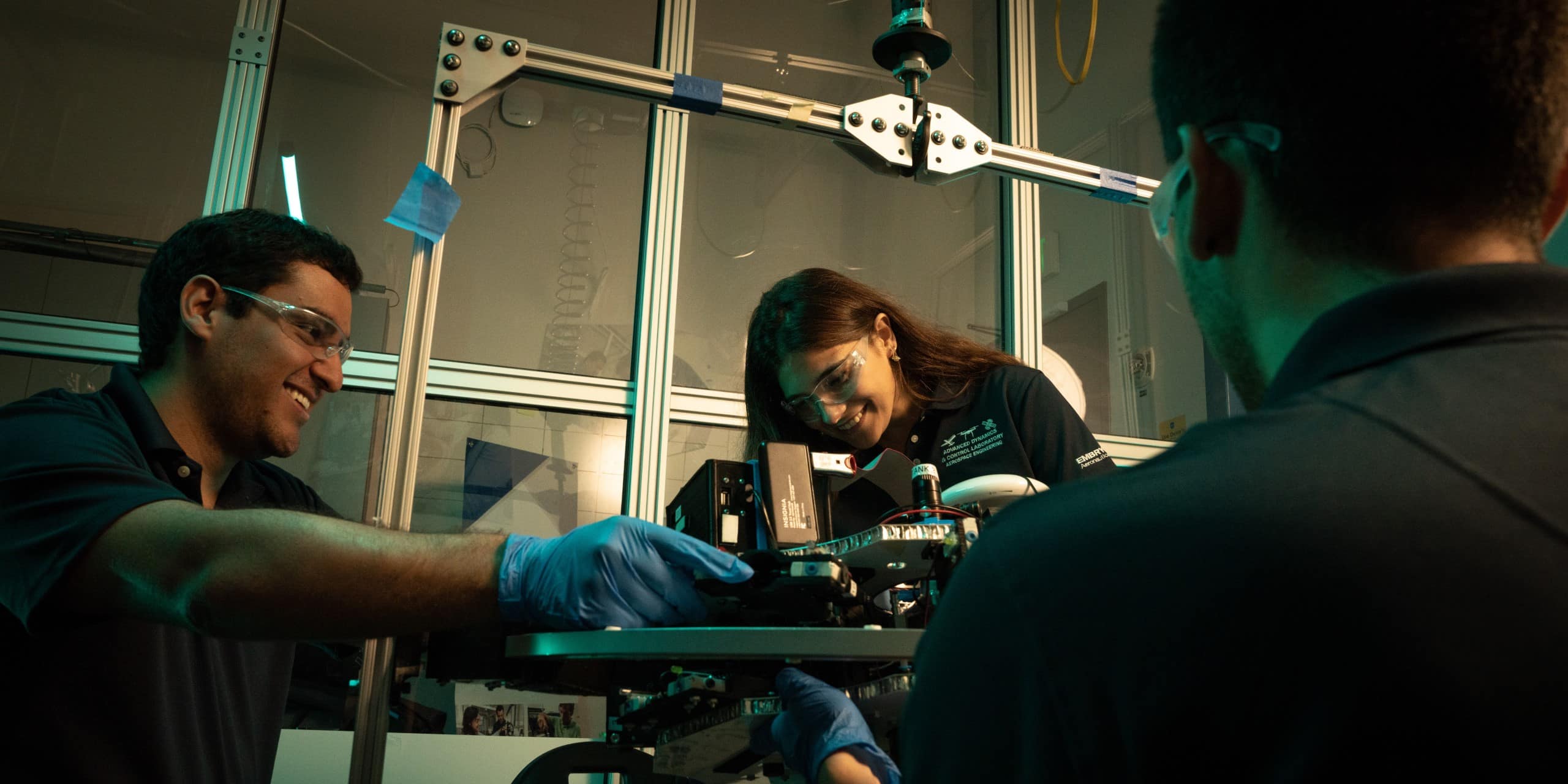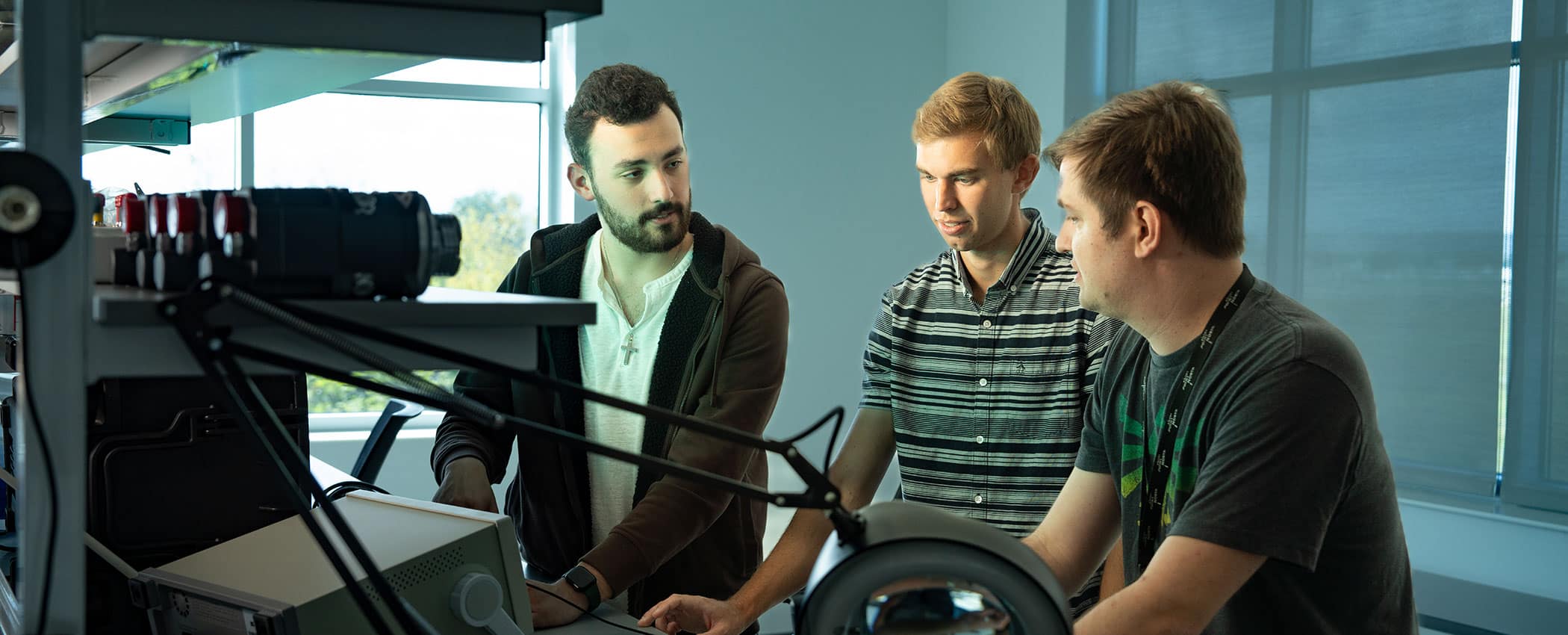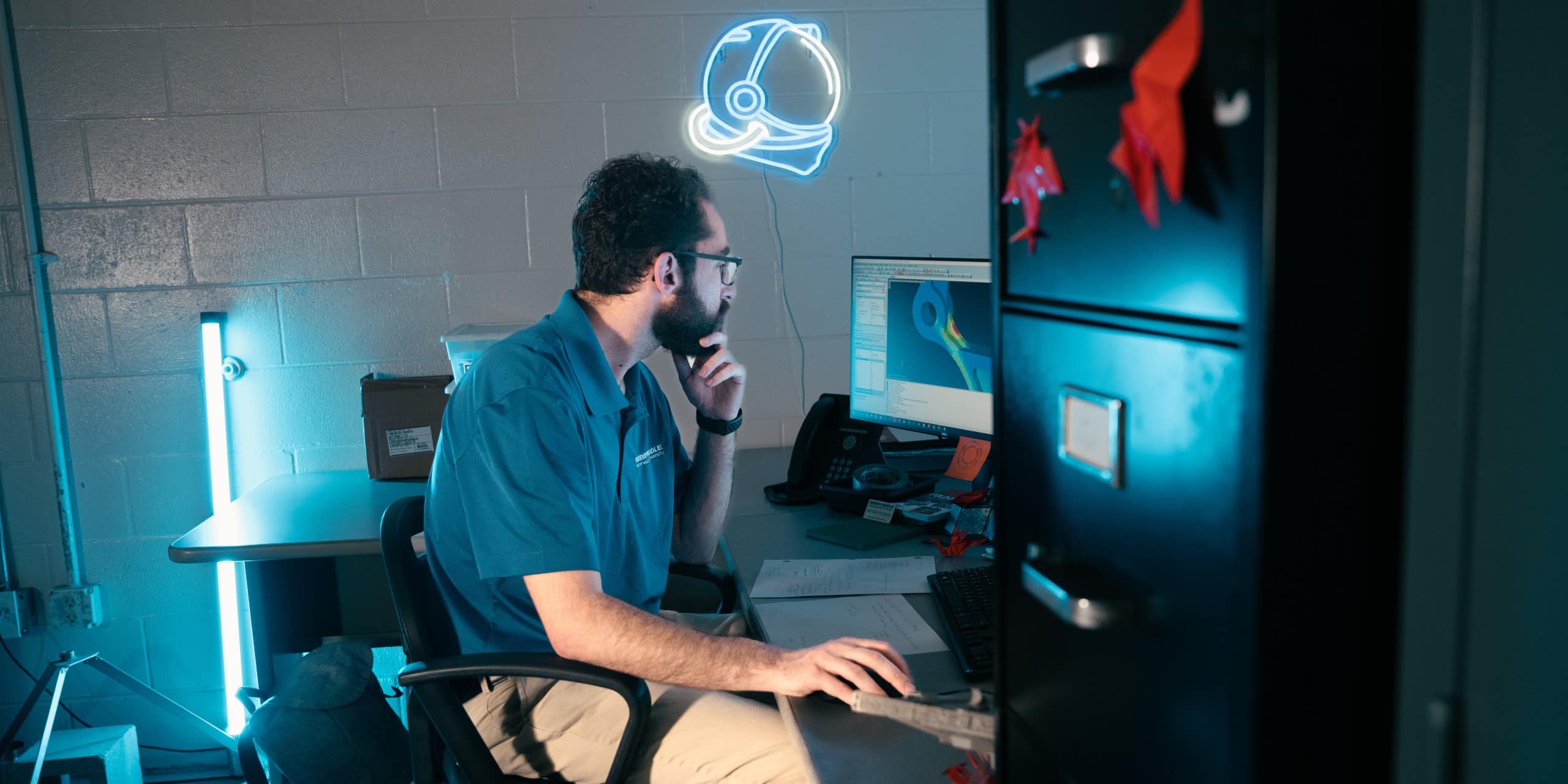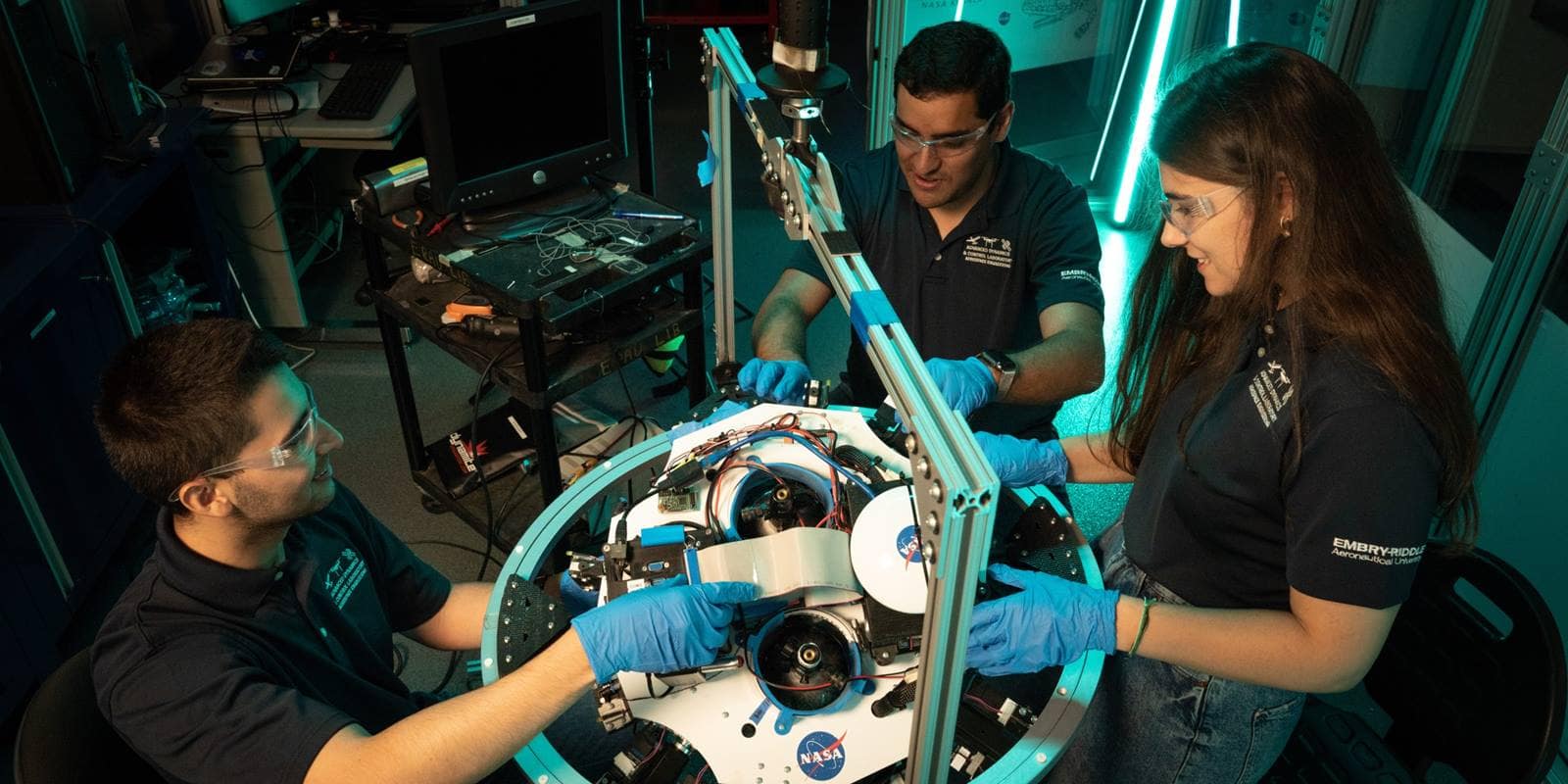
Bachelor of Science in
Engineering
The Bachelor of Science in Engineering is a multidisciplinary degree that prepares students for aeronautical, mechanical, electrical and mechatronics fields.
About the Bachelor of Science in Engineering
At Embry‑Riddle Aeronautical University, we’re preparing our students to help fill the demand for engineers with the Bachelor of Science in Engineering at our Worldwide Campus. The U.S. Bureau of Labor Statistics projects increased demand for engineers with nearly 140,000 new jobs expected between 2016 and 2026.
Designed from a multidisciplinary perspective with subject matter ranging from mechanical, electrical, aeronautical and systems engineering, the online engineering degree intends to help graduates bridge the gap across disciplines to explore innovative solutions to many tasks.
Program Educational Objectives
The engineering program will prepare:
- Technically competent graduates for a successful and productive career in the engineering profession capable of developing creative solutions to contemporary problems
- Graduates who are capable of pursuing postgraduate studies and research
- Graduates who can demonstrate their effective leadership, communication and teamwork skills in a diverse environment
- Graduates with the desire for life-long learning for the purpose of professional integrity
Student Learning Outcomes
The student learning outcomes for the BSE program are:
- an ability to identify, formulate, and solve complex engineering problems by applying principles of engineering, science, and mathematics.
- an ability to apply engineering design to produce solutions that meet specified needs with consideration of public health, safety, and welfare, as well as global, cultural, social, environmental, and economic factors.
- an ability to communicate effectively with a range of audiences.
- an ability to recognize ethical and professional responsibilities in engineering situations and make informed judgments, which must consider the impact of engineering solutions in global, economic, environmental, and societal contexts.
- an ability to function effectively on a team whose members together provide leadership, create a collaborative and inclusive environment, establish goals, plan tasks, and meet objectives.
- an ability to develop and conduct appropriate experimentation, analyze and interpret data, and use engineering judgment to draw conclusions.
- an ability to acquire and apply new knowledge as needed, using appropriate learning strategies.
Engineering Career Opportunities
Careers and Employers
With an 83% placement rate, Embry-Riddle graduates earning a multidisciplinary degree in Engineering often accept employment offers from notable employers including Honeywell, Lockheed Martin, NASA, and the U.S. Department of Defense.
Engineering students are set to work in engineering fields related to aeronautical, mechanical, electrical and mechatronics. Graduates of the program are also prepared to pursue graduate studies and research, with many finding careers as systems engineers, product development engineers, aerospace engineers and electronics engineers.
Engineering Salary Information
Receiving an online engineering degree from Embry-Riddle provides the opportunity for competitive salaries, with alumni averaging $80,000 annually as of 2021.
DETAILS
About Engineering at the Asia Campus
A degree in Engineering can open doors to exciting career opportunities in Asia's rapidly growing aviation and aerospace industry. This translates to a continuous need for talent with skillsets in understanding how things that an engineer would gain at Embry-Riddle.
Some promising avenues an engineer could explore in the aviation/aerospace industry in Asia include a licensed aircraft engineer (LAE), propulsion engineer, avionics engineer and airworthiness engineer. In a growing field such as uncrewed and autonomous aircraft operations, career paths into uncrewed aerial vehicles (UAVs) and urban air mobility are rapidly expanding. Possible employers include companies such as Airbus, Boeing, Singapore Airlines Engineering Company (SIAEC), ST Engineering, Pratt & Whitney and DJI, to name a few.
Program Information
- Qualification: BSc. in Engineering
- Study Modes: Full-Time and Part-Time
- Delivery: Classroom and Online (Blended)
- Credits Required: 127*
- Duration: 48-60 months (average with credit exemptions is 24 months)
Professional Accreditation
The Engineering program is accredited by the Engineering Accreditation Commission of ABET.
Helpful Links
- Find Related Clubs & Organizations
- Explore Career Spotlights
- See where Aeronautics alumni work
* Additional modules may be required based on placement examination results in mathematics and English.
Students will:
- Have an ability to identify, formulate, and solve complex engineering problems by applying principles of engineering, science, and mathematics.
- Have an ability to apply engineering design to produce solutions that meet specified needs with consideration of public health, safety, and welfare, as well as global, cultural, social, environmental, and economic factors.
- Have an ability to communicate effectively with a range of audiences.
- Have an ability to recognize ethical and professional responsibilities in engineering situations and make informed judgments, which must consider the impact of engineering solutions in global, economic, environmental, and societal contexts.
- Have an ability to function effectively on a team whose members together provide leadership, create a collaborative and inclusive environment, establish goals, plan tasks, and meet objectives.
- Have an ability to develop and conduct appropriate experimentation, analyze and interpret data, and use engineering judgment to draw conclusions.
- Have an ability to acquire and apply new knowledge as needed, using appropriate learning strategies.
DEGREE REQUIREMENTS
| General Education Core | ||
| UNIV 101 | College Success | 1 |
| ENGL 123 | English Composition | 3 |
| ENGL 221 | Technical Report Writing | 3 |
| COMD 219 | Speech | 3 |
| Mathematics | ||
| MATH 241 | Calculus and Analytical Geometry I | 4 |
| MATH 242 | Calculus and Analytical Geometry II | 4 |
| Computer Science/Information | ||
| ENGR 115 | Introduction to Computing for Engineers | 3 |
| Physical and Life Sciences | ||
| PHYS 150 | Physics I for Engineers | 3 |
| PHYS 160 | Physics II for Engineers | 3 |
| Humanities/Social Sciences | ||
| SOCI 210 | Introduction to Sociology | 3 |
| HUMN 330 | Values and Ethics | 3 |
| HUMN 400 | Science and Aviation/Aerospace Technology in Society | 3 |
| ECON 225 | Engineering Economics | 3 |
| Total Credits | 39 | |
Core
| Singapore Specific Core | ||
| COIN 496 | Co-Operative Education * | 3 |
| or LGMT 420 | Management of Production and Operations | |
| Total Credits | 3 | |
* COIN 496 is a mandatory 3 credit course module intended for all undergraduate students to take as part of the Bachelor of Science in Engineering offered through the Singapore location. Under certain extenuating circumstances, COIN 496 may be substituted on a case-by-case basis for LGMT 420 Management of Production and Operations in discussion with the Academic Advising Team. COIN 496 is an industry attachment serving as a structured supervised internship through which a student is personally coached by expert faculty. COIN 496 intends to add value to the student experience and benefit student employability upon completion of the degree program.
| Aeronautical Engineering | ||
| AERO 309 | Aerodynamic Performance of Flight Vehicles | 3 |
| ENGR 350 | Project Management for Engineered Systems | 3 |
| Total Credits | 6 | |
| Engineering | ||
| ENGR 101 | Introduction to Engineering | 3 |
| ENGR 120 | Graphical Communications | 3 |
| ENGR 330 | Signals & Systems | 3 |
| ENGR 331 | Signals & Systems Laboratory | 1 |
| ENGR 400 | Fundamentals of Energy Systems | 3 |
| ENGR 450 | Systems and Controls | 3 |
| Total Credits | 16 | |
| Engineering Science | ||
| ESCI 201 | Statics | 3 |
| ESCI 202 | Solid Mechanics | 3 |
| ESCI 204 | Dynamics | 3 |
| ESCI 325 | Engineering Materials and Structures | 3 |
| Total Credits | 12 | |
| Computer Engineering | ||
| CESC 220 | Digital Circuit Design | 3 |
| CESC 222 | Digital Circuit Design Laboratory | 1 |
| Total Credits | 4 | |
| Electrical Engineering | ||
| ELEC 220 | Circuits | 3 |
| ELEC 221 | Circuits Laboratory | 1 |
| ELEC 230 | Electronics | 3 |
| ELEC 231 | Electronics Laboratory | 1 |
| Total Credits | 8 | |
| Physical Science | ||
| ESCI 206 | Fluid Mechanics | 3 |
| ESCI 305 | Thermodynamics | 3 |
| PHYS 250 | Physics III for Engineers | 3 |
| PHYS 253 | Physics Laboratory for Engineers | 2 |
| Total Credits | 11 | |
| Mechanical Engineering | ||
| MECH 302 | Introduction to Robotics | 3 |
| MECH 303 | Robotics Laboratory | 1 |
| MECH 313 | Instrumentation and Data Acquisition | 2 |
| MECH 314 | Instrumentation and Data Acquisition Laboratory | 1 |
| ENGR 404 | Mechatronics | 3 |
| ENGR 405 | Mechatronics Laboratory | 1 |
| Total Credits | 11 | |
| Mathematics | ||
| MATH 243 | Calculus and Analytical Geometry III | 4 |
| MATH 345 | Differential Equations and Matrix Methods | 4 |
| STAT 412 | Probability and Statistics | 3 |
| Total Credits | 11 | |
| Capstone | ||
| ENGR 490 | Capstone Design Project I | 3 |
| ENGR 491 | Capstone Design Project II | 3 |
| Total Credits | 6 | |
| Total Degree Requirements | 127 | |
The following modules may be required based on placement examination results:
| ENGL 104 | Basic English | 1 |
| ENGL 106 | Introduction to Composition | 3 |
| MATH 100 | Foundations in Mathematical Problem Solving | 3 |
| MATH 106 | Basic Algebra & Trigonometry | 3 |
Get Started Now:
Degree Resources
127 Credits
View Financial Aid and Tuition Information
Learn about our General Education
